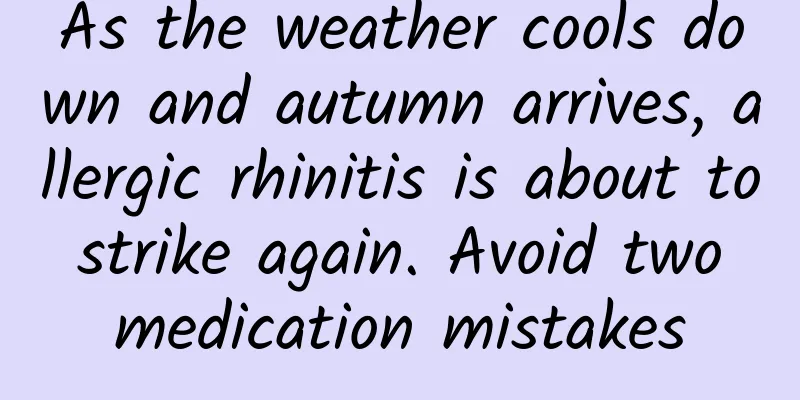As the weather cools down and autumn arrives, allergic rhinitis is about to strike again. Avoid two medication mistakes

|
As the weather got colder in the fall, a friend of Huazi's had a stuffy nose, headaches, and constant sneezing. Huazi asked him what was wrong, and his friend replied with tears in his eyes that he suffered from seasonal allergic rhinitis every fall, which was very painful, but the medication was not effective. Huazi told him that autumn is a season when allergic rhinitis is prone to occur, as is spring, because of its dry climate and alternating hot and cold weather. In the use of medication for allergic rhinitis, people often make two mistakes: one is taking the medication too late, and the other is taking the medication too soon. 1. Allergic rhinitis is becoming more and more common. Because modern people have high work pressure, generally declining physical fitness, and insufficient immunity, allergic rhinitis is becoming more and more common. Especially when the seasons change, temperature changes, particles emitted by plants, dust mites, air pollution and other factors may lead to the occurrence of allergic rhinitis. When the seasons change, colds and flu are more common. The symptoms of allergic rhinitis and viral infection are similar, so be careful to distinguish them. Viral infection is usually accompanied by headache, sore throat, and fever, while allergic rhinitis is mainly characterized by nasal congestion, runny nose, and itchy eyes. The most typical symptom is continuous sneezing. 2. Common Misunderstandings in Medication for Allergic Rhinitis 1. Medication is taken too late: The treatment of allergic diseases mainly uses antihistamines (i.e. anti-allergic drugs). When the human body encounters allergens, cells will release histamine, inflammatory factors and other substances that cause allergic reactions. Anti-allergic drugs can inhibit the release of allergic substances, but have no effect on allergic substances that have already been released. Therefore, when taking anti-allergic drugs after an allergic reaction occurs, the allergic symptoms will only stop after the released allergens are consumed. For some people with hypersensitive constitutions, even a little bit of allergens will cause a violent reaction. Therefore, for seasonal allergic rhinitis with a relatively fixed onset time, medication should be started 2 weeks before the onset time to achieve the best control of allergic symptoms. 2. Medication is used for too short a time: Many people stop taking medication when the symptoms disappear, which results in repeated attacks of the disease. This is because anti-allergic treatment is essentially a "symptomatic" treatment. When the medication is stopped, if the allergen does not disappear, it will stimulate the body's allergic reaction and continue to cause symptoms. Usually, seasonal allergens will exist for about 2 weeks, so anti-allergic drugs should be taken according to this schedule. In other words, seasonal allergic rhinitis should start taking medication 2 weeks before the allergy occurs and continue until after the allergy season, which takes about 1 month in total. 3. Methods to reduce allergic rhinitis attacks Avoiding contact with allergens is the main method to reduce allergic rhinitis attacks. However, this method is not easy to achieve, mainly because everyone is exposed to a lot of substances in daily life, and allergens are difficult to identify. In addition, it is difficult to completely block tiny particles in the air, and masks with high filtration rates will increase breathing pressure and make people uncomfortable, so it is very important to carry out correct anti-allergy treatment. If the medication is not taken in time or the allergic reaction is too severe, you can use glucocorticoids under the guidance of a doctor. Glucocorticoids are very effective in inhibiting allergic reactions, but they have many side effects, so they are not suitable for long-term use. For those with obvious local symptoms such as nasal congestion and itchy eyes, topical anti-allergic drugs such as nasal sprays and eye drops can also be used for local treatment. In the allergy season, rinsing the nasal cavity with saline every day can reduce the stimulation of allergens and alleviate allergic symptoms. If the allergens can be identified, desensitization therapy can be carried out under the guidance of a doctor to reduce or eliminate allergic reactions. Paying attention to maintaining a balanced diet, exercising, and improving the body's resistance is a fundamental way to cure allergic rhinitis. To sum up, when dealing with seasonal allergic rhinitis, you need to pay attention to two issues when taking medicine to achieve the best effect. First, you should start taking the medicine 2 weeks in advance, and second, you should continue taking the medicine until the allergy season is over. Although most anti-allergic drugs are "over-the-counter drugs", in order to ensure safe and effective use, the drugs are best used under the guidance of a doctor or pharmacist. I am pharmacist Huazi, welcome to follow me and share more health knowledge. |
<<: Cover up in spring and keep cool in autumn! How should children keep cool in autumn?
Recommend
Characteristics of the first menstrual period after childbirth
It is well known that when a woman becomes pregna...
Can I take weight loss products during breastfeeding?
Everyone loves beauty, and many mothers can't...
Why do humans "lose" most of their memories before the age of 3? The answer is beyond your imagination
From the day you were born, to babbling, to learn...
How long does it take for the cervix to disappear in late pregnancy?
How long does it take to get pregnant after the c...
At what age do girls start to develop?
Almost all schools now attach importance to the p...
Can you eat bitter baby cabbage? Why is baby cabbage bitter?
Baby cabbage is fresh, tender, delicious, and nut...
Gynecologists' priceless tips for maintaining ovaries
Nowadays, many girls are paying attention to ovar...
What causes moderate cervical erosion?
Everyone should be familiar with cervical erosion...
What is the cause of vaginal discharge that is like tofu dregs?
Everyone knows that female friends will suffer fr...
What is green and healthy laundry detergent? How to use laundry detergent
Laundry detergent can make clothes fluffy, soft, ...
Does a long menstrual cycle affect pregnancy?
If a woman wants to get pregnant, she must adjust...
Is it normal to have your period eight days early?
If the frequency does not exceed two times, it is...
List of "Science" Rumors in December 2022: Can Yangkang produce antibodies in 15 days? Can sweating reduce fever?
The list of "scientific" rumors for Dec...
Is it normal that my breasts have not swelled after two and a half months of pregnancy?
In the early stages of pregnancy, women are prone...
What are the dangers of lack of sleep for women?
It is quite dangerous for women to lack sleep, be...









